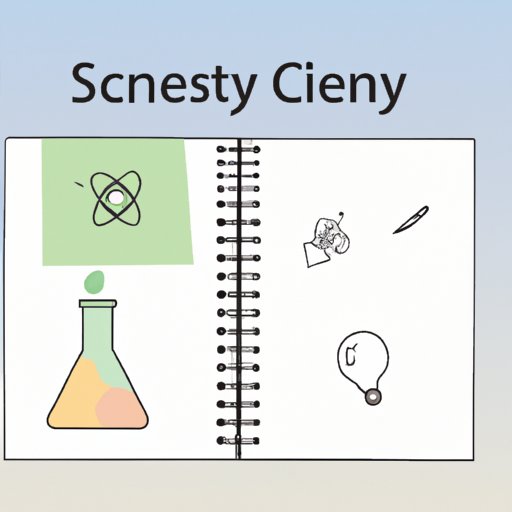Introduction
Keeping a science notebook can be a great way to document experiments, track progress, and organize information. But what exactly is a science notebook? A science notebook is a tool used by students, scientists, and other researchers to record observations, ideas, data, questions, and other information related to an experiment or study. It serves as a valuable reference throughout the research process, allowing individuals to look back on their work and review past findings.
The benefits of keeping a science notebook are numerous. Not only does it help with the organization of data and notes, but it can also significantly improve one’s learning experience. By documenting experiments and reflecting on their results, individuals can enhance their understanding, encourage creativity, and develop their critical thinking skills.
A Guide to Keeping a Science Notebook: What It Is and How to Use It
When it comes to keeping a science notebook, there are several key components to consider. It’s important to understand the types of entries that should be included, the format in which they should be written, and the methods of documenting experiments.
Types of Entries
The types of entries that should be included in a science notebook depend on the individual’s purpose for the notebook. Generally, the following types of entries are recommended:
- Observations
- Ideas
- Questions
- Data
- Notes
- Drawings
- Photographs
- Graphs
Formatting Tips
When writing in a science notebook, it’s important to be mindful of the format you use. According to the Journal of Science Education and Technology, “It is important to write in a consistent format, with clear headings and subheadings, so that future readers can quickly and easily access the information.” Additionally, it is recommended to make use of tables, diagrams, and other visuals to help organize your thoughts and make them easier to understand.
Ideas for Documenting Experiments
In addition to the general tips above, there are some specific strategies that can be used when documenting experiments. For example, it is important to keep track of the steps taken during each experiment, as well as any changes that were made along the way. Additionally, it is a good idea to include any insights or reflections you may have had while completing the experiment. This can be a great way to gain a deeper understanding of the process and your results.
How Keeping a Science Notebook Can Improve Your Learning Experience
Beyond helping with organization and documentation, keeping a science notebook can also have a positive effect on one’s learning experience. There are several ways in which this can happen.
Enhancing Understanding
Writing down observations, ideas, questions, and other information can help individuals gain a deeper understanding of the subject matter. According to a study published in the American Journal of Physics, “The use of notebooks can lead to deeper understanding of physical principles, improved problem solving skills, and enhanced communication skills.” By taking the time to document their thoughts and reflect on them, individuals can gain a better understanding of their research and the overall process.
Encouraging Creativity
Keeping a science notebook can also encourage creativity. Writing down ideas, sketches, and diagrams can provide a space to think outside of the box and come up with new solutions to problems. Additionally, having a physical record of one’s thoughts and ideas can be a great way to inspire further exploration and experimentation.
Developing Critical Thinking Skills
Finally, keeping a science notebook can help develop critical thinking skills. By taking the time to document observations, ask questions, and reflect on results, individuals can learn to think more critically about the experiments they are conducting. Through this process, they can gain a better understanding of the research process and become better at interpreting and analyzing data.

The Benefits of Keeping a Science Notebook
In addition to the learning benefits discussed above, there are other advantages to keeping a science notebook. These include improved time management, increased memory retention, and greater organization and efficiency.
Time Management
Having a physical record of one’s experiments and ideas can be a great way to save time. Instead of searching through notes and papers to find the information you need, you can simply flip through your science notebook and quickly find what you’re looking for.
Improved Memory Retention
Additionally, keeping a science notebook can help with memory retention. By writing down observations and ideas, individuals can better remember the details of their experiments and research projects. This can be especially helpful when working on long-term projects that require multiple steps and lots of data.
Organization and Efficiency
Finally, keeping a science notebook can help with organization and efficiency. Having all of your information in one place makes it easier to review past experiments, compare data, and draw conclusions. This can be especially beneficial when working on complex research projects.

Exploring the Different Types of Science Notebooks
When it comes to keeping a science notebook, there are several options to choose from. Here is a brief overview of the three main types of science notebooks.
Traditional Notebooks
The most common type of science notebook is the traditional paper-and-pencil notebook. This type of notebook is inexpensive, easy to use, and provides plenty of space for writing down observations, ideas, and other information. Additionally, this type of notebook can be used to store photographs, drawings, and other visuals.
Digital Notebooks
Another option is to keep a digital science notebook. Using a computer or tablet, individuals can keep track of their experiments and research projects with ease. Digital notebooks offer a variety of features, such as the ability to store photos and videos, create graphs and charts, and even collaborate with others.
Hybrid Models
Finally, there are hybrid models that combine the best of both worlds. These notebooks allow individuals to use a combination of paper and digital tools to document their experiments and research projects. This type of notebook offers the flexibility of a digital notebook, with the convenience and portability of a traditional notebook.

Creating an Effective Science Notebook Strategy
Once you’ve decided which type of science notebook to use, the next step is to create an effective strategy for using it. Here are some tips for getting started.
Establishing Goals
Before you begin using your science notebook, it’s important to establish some goals. Think about what you want to accomplish with your notebook and set realistic expectations for yourself. This will help you stay focused and motivated as you document your experiments and research projects.
Setting Timelines
It can also be helpful to set timelines for yourself. Establishing deadlines for when you want to complete certain tasks or finish a project can help keep you on track and ensure that your work is done in a timely manner.
Developing Habits
Finally, developing habits is key to making the most of your science notebook. Taking the time to write down observations and ideas, reflect on your results, and review previous experiments can help you stay organized and efficient. Additionally, setting aside time each day to document your experiments can help ensure that all of your work is properly recorded.
Tips for Making the Most of Your Science Notebook
Now that you know the basics of keeping a science notebook, here are some tips for making the most of it.
Prioritize Quality Over Quantity
When writing in your science notebook, it’s important to prioritize quality over quantity. While it’s important to record all of your observations and ideas, it’s equally important to make sure that what you write is clear, concise, and accurate.
Be Consistent With Your Entries
It is also important to be consistent with your entries. Try to write down observations, ideas, and other information as soon as possible after they occur. This will help ensure that your records are accurate and up-to-date.
Utilize Reflection Time
Finally, it’s a good idea to take some time to reflect on your experiments and the results you’ve achieved. Reflecting on what you’ve learned and what could be done differently can help you gain a deeper understanding of the process and prepare you for future projects.
Conclusion
Keeping a science notebook can be a great way to document experiments, track progress, and organize information. It can also significantly improve one’s learning experience by enhancing understanding, encouraging creativity, and developing critical thinking skills. Additionally, it can help with time management, memory retention, and organization and efficiency. Finally, there are several types of science notebooks to choose from, including traditional, digital, and hybrid models. By establishing goals, setting timelines, and developing habits, individuals can create an effective science notebook strategy and make the most of their notebook.
In conclusion, keeping a science notebook can be a great way to document experiments, track progress, and improve one’s learning experience. With the right strategy and a little bit of effort, individuals can make the most of their science notebook and reap the many benefits it has to offer.
(Note: Is this article not meeting your expectations? Do you have knowledge or insights to share? Unlock new opportunities and expand your reach by joining our authors team. Click Registration to join us and share your expertise with our readers.)
